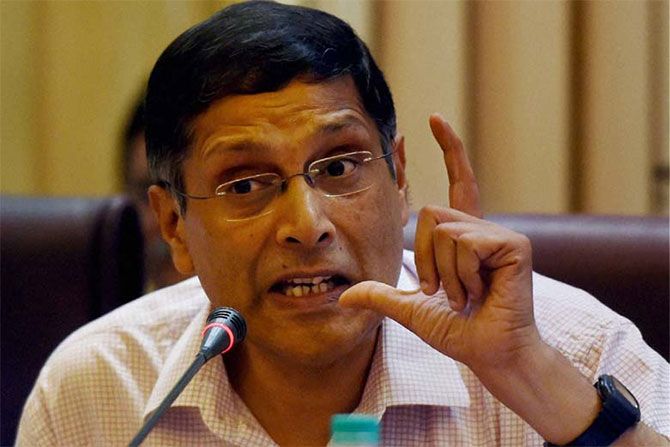CEA offers three compelling arguments in his case for privatisation of government-owned banks.

Chief Economic Advisor to the Government of India, Arvind Subramanian, has called for increasing privatisation of public sector banks and implementing stricter banking rules.
His views come against the backdrop of recent developments in a few PSBs. While Punjab National Bank detected fraudulent transactions amounting to more than $1.77 billion from one of its branches in Mumbai, Bank of Baroda has decided to shut down its South African operations after a scandal was unearthed. The country's largest government-owned lender, the State Bank of India (SBI) had also reported loans frauds.
Addressing the Madras Management Association (MMA) Annual Convention in Chennai on Saturday, Subramanian said two key questions arose on the way forward for the banking industry: first, if not now, when? second, if not this, what?.
While stating that the internal controls in a bank had broken down for whatever reasons, the CEA wondered what happened to the external controls exercised by the regulator and the supervisor.
To avoid such scams from recurring in the future, he advocated privatisation of a larger number of public sector banks, and also sought more stringent scrutiny on the part of the banking regulator.
Subramaniam said there were three reason for greater privatisation. The first one is that public sector ownership serves as a handicap in bank recruitments, human resources procurement and governance, especially when they need more freedom to compete with private sector lenders. The second reason is that the decision making in Indian government is almost paralysed due to the four 'C's -- courts, CBI, CVC and CAG.
"Good decision-making is affected by these government structures, and we need to relieve the pole overhanging the public sector. One way would be more private sector participation," he said.
The third argument is that the private sector has been a creator of wealth at least in the past three-and-a-half years.
Dwelling on the 4 'R's (recognition, resolution, recapitlisation and reforms) meant to support the banking system, Subramanian said, “We failed to recognise the fifth R, which is regulation of the banking system.”
He said a lot of progress had been made in the recognition of bad and stressed assets in the past 2-3 years, and the government is now coming close to putting a finger on the exact quantum of such assets in the banking system. However, he cautioned the audience that the actual number is 20-30 per cent more than what has been recognised at any given point of time.
The other two 'R's, resolution and recapitalisation have been under execution and are progressing well. However, Subramanian said ban recapitalisation must be accompanied by checks to ensure that the issues related to NPA aren't repeated and that NPAs are well managed. Another pressing factor is the haircut that the banks will take and the general question is whether such a step will be worth the effort.
On the fourth 'R' (reform) the government is putting a lot of money in this area to ensure its effectiveness. Greater privatisation could be one way to ensure the success of reforms, and those who argue for better governance over privatisation have to examine whether their recommendations can guarantee a better system pf governance than has been achieved in the past.
“Going forward, we should have less public lending to private sector and the way to achieve that is to have more private sector participation in the banking system,” Subramanian asserted.
On the fifth 'R', which is regulation, he said, “While the internal controls have broken down in the (banking) system, for whatever reason, what about the external controls that were exercised by the regulator and the supervisor? What was happening there as well? That is an important question we need to ask going forward, when we think about the fifth 'R'”.
“In terms of reviving banks, two questions need to be addressed: If not now, When? If not this, What? I hope in the days and months ahead these questions will become important and if that is done we have a very good shot at India continuing to be (regarded as), or regaining the status of the fastest (growing economy) in the world,” he said.
Photograph: PTI Photo.












 © 2025
© 2025